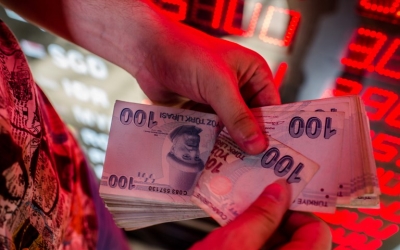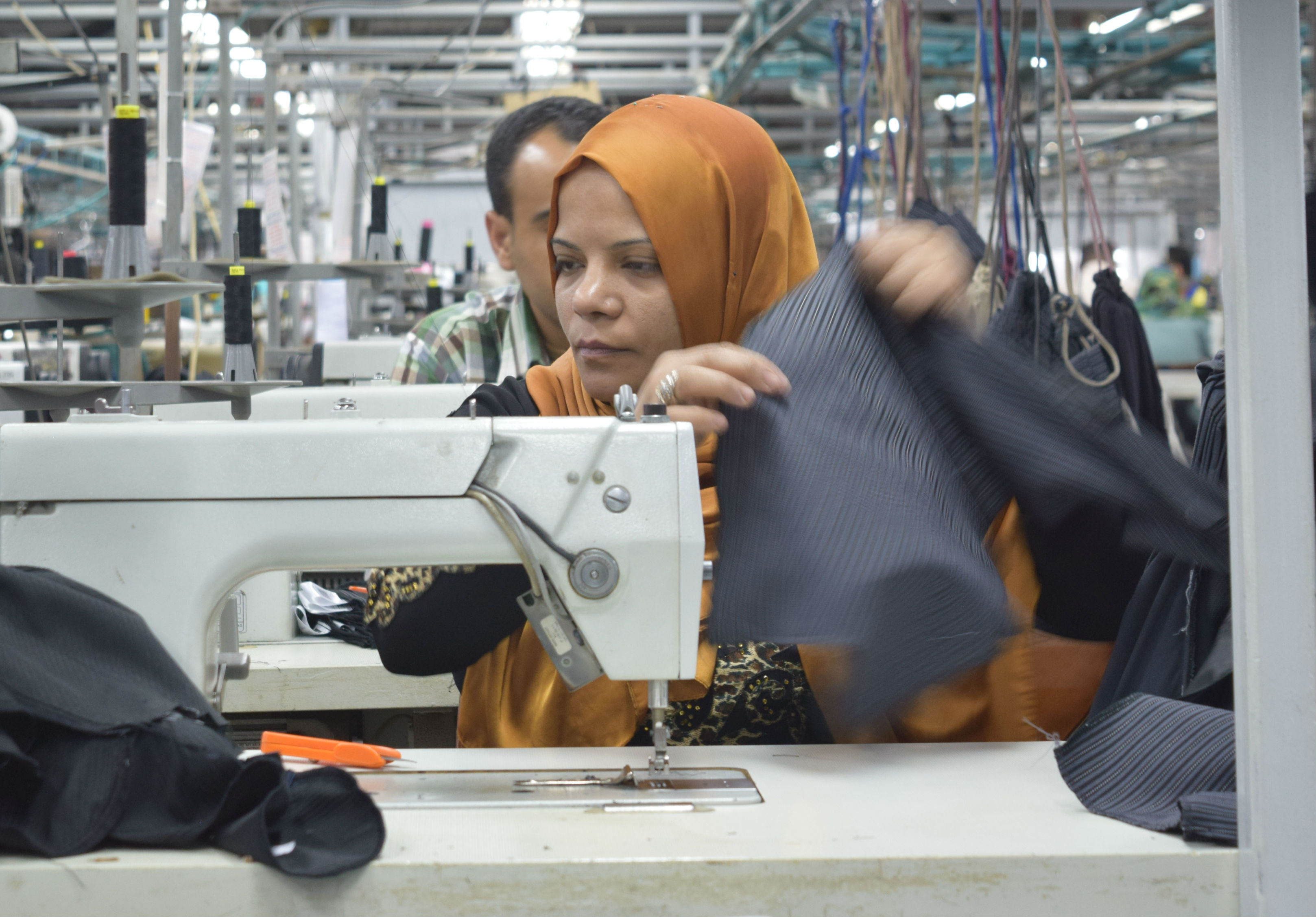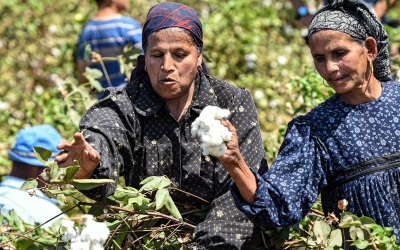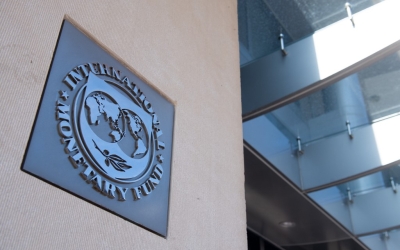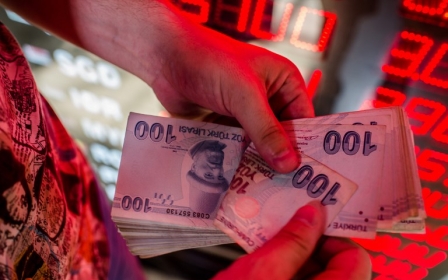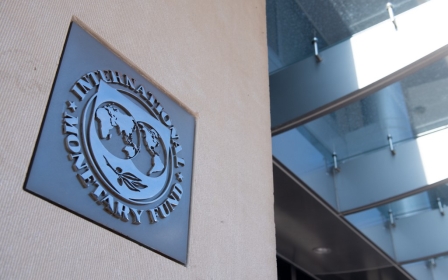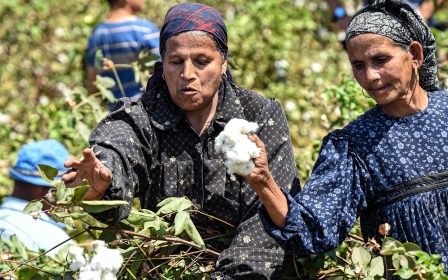Coronavirus: Turkey and Egypt garment manufacturers squeezed by global brands
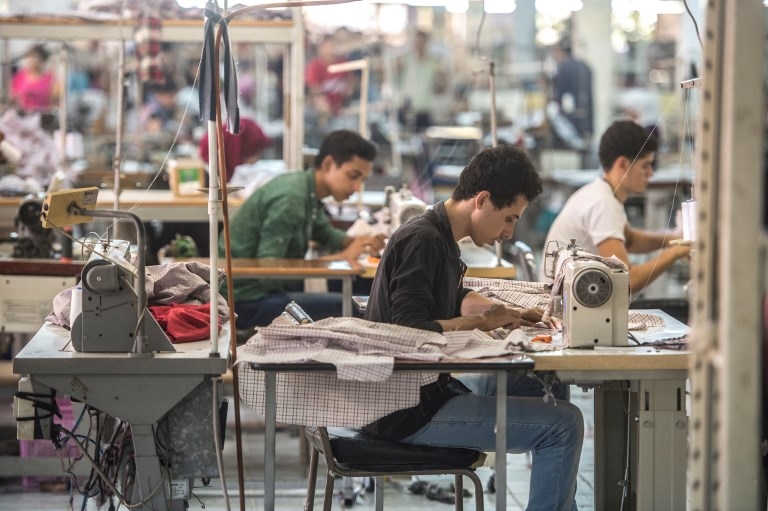
The Turkish and Egyptian garment manufacturing sectors employ millions of people, but big brands have left them in the lurch with cancelled orders and millions of completed items not dispatched in the wake of the coronavirus pandemic.
Towards the end of 2019, the Egyptian government and export associations hosted a sourcing event in Cairo, called Destination Africa, to bring together buyers from the West and manufacturers in Egypt and from around the continent.
Such trade events are held around the world at convention centres or high-end hotels, featuring gala dinners and spectacles to woo buyers, and seminars that discuss sustainability, modernising the supply chain and the future of the $2.7tn fashion industry.
After several rough years in the wake of the 2011 uprising, Egyptian manufacturers were keen to drum up business, increase the $3bn in garment and textile exports in 2019 and double the number of employees in the industry to two million by 2025.
Over in Turkey, the world’s fifth largest garment and textile exporter had hosted similar events throughout the year to tout its manufacturing prowess and increase its $26bn in exports.
Such outlays were paying off, with solid order books for 2020 and exports on the rise in the first few months of the year.
Turkey and Egypt were also riding high on buyers increasingly diversifying their sourcing from China due to the US-China trade war and wanting closer proximity to the European market.
Cancelled until further notice
Up until March, some one million Egyptian and 1.5 million Turkish workers were busy spinning, dying, cutting and sewing garments for the summer season, which accounts for around half of annual sales.
Then Covid-19 started to sweep across Europe and North America which, along with Japan, account for around 80 percent of global fashion consumption.
Countries went into lockdown mode, and to the manufacturers’ surprise, major brands and retailers went “incommunicado”, said a Turkish manufacturer who wanted anonymity over concerns about future business relationships with leading brands.
“At first there was no communication at all from corporate buyers," he told Middle East Eye by phone from Istanbul.
"They were not saying, we will pay you late, or we’ll take the goods at some point. There was complete silence, even about goods delivered weeks or months before.”
While 80 percent of Turkish factories closed in the first several weeks of the lockdown - around 60 percent are open today - the sector was left with over $2.5bn in ordered inventory and a further $1bn in orders in production, or already produced, that were cancelled until further notice, said Hadi Karasu, President of the Turkish Clothing Manufacturers’ Association (TGSD).
“Factories were forced to cover the fabric and accessories they bought from brand-designated raw material suppliers," Karasu told MEE.
"These manufacturers operate at single-digit margins while they are being asked to keep the materials for an unforeseeable future.
"Around 50 to 60 percent of a product’s cost is raw material.”
'It is very tough'
In Egypt, manufacturers were also left in the lurch by the buyers.
“Everything that could be done has been done [by the buyers], from taking goods and not paying for them, to cancellations," said Samir Riad, general director of the Riad Group, a textile and garment manufacturer in Cairo.
"Some manufacturers have even had containers [of finished garments] not being accepted. There are all sorts of nightmarish stories,” he told MEE.
Around 60 percent of Egyptian exports are to the USA, the remainder to Europe.
“The majority [of buyers] haven’t taken responsibility for purchases they made, which is terrible," said Riad.
"It is very tough, you have overheads, wages to pay, and this isn’t a cash-rich industry,” he added.
When the buyers did get in contact with manufacturers, they wanted to impose new terms and extend payment terms by 90 days to 180 days.
“They ask for a 50 percent discount but settle for five to 10 percent, which means their financial situation allows them to bargain,” said Karasu.
While some brands like Levi’s, Adidas and H&M have honoured their contracts, many of the leading high street retailers and luxury brands have not.
Manufacturers are hesitant to name names so as not sour future relations, but according to Sourcing Journal, labels that have not paid for orders include Topshop, Gap, Mothercare, Next and Walmart.
'Both sides need each other'
Manufacturers are aware that it is a difficult time for the retail sector.
Worldwide, garment orders are down by 41 percent, according to the International Textile Manufacturers Federation (ITMF), while sales turnover is forecast to contract by 33 percent in 2020.
'You cannot just blame the buyers. There has to be cooperation and some sort of solidarity'
- Navdeep Sodhi, Gherzi Textile Organisation
“The buyers’ reaction has been catastrophic… and outright cancellations have been quite devastating, but we have to be pragmatic," said Navdeep Sodhi, partner at the Switzerland-based Gherzi Textile Organisation.
"You cannot just blame the buyers. There has to be cooperation and some sort of solidarity, as in the long-run both sides need each other," he told MEE.
Manufacturers and export associations have called for greater cooperation with buyers to hash out agreeable terms.
But with European and North American governments providing stimuluses to keep their economies afloat, manufacturers want more assurances.
“Buyers are suffering from cashflow issues, but the factories are in a worse situation, as in Egypt you’re not free to let workers go, so you are stuck," said Mohamed Kassem, chairman of the Egyptian Company for Textile Parks Development, in Cairo.
"It is not a ‘fire and hire situation’ like in Europe or the USA. Things are not pretty at all, and we don’t know how it will work out in the end,” he told MEE.
'White gold'
Many of Egypt’s 7,000 garment and textiles factories are expected to go under this year if the situation continues.
“The only thing that will keep them from closing is if retailers don’t drop manufacturers like flies,” said Riad.
Egyptian exports of “white gold”, extra-long staple cotton acclaimed for being the best in the world, is also likely to be impacted.
“The cotton that goes into home textiles, like fine bed linen for export, is likely to be less affected by the pandemic but a lot of the Egyptian cotton used for fine shirting is likely to be affected," said Sodhi. "Overall, everything in the industry is affected.”
Turkey is in a better position than Egypt to weather the storm.
Egypt is considered a basic "cut and sew" sourcing hub, with salaries at around $100 a month, whereas Turkey has a far more modernised industry, which enables it to be globally competitive despite higher wages of around $600 a month.
The Turkish government has extended financial support to the sector. However, with a 50 percent drop in orders in the second quarter, forecasted drops of 30 percent in the third quarter and 20 percent in the last three months of 2020, an overall decline of 20 to 30 percent is expected compared to the $17.5bn in garment exports in 2019.
“We at least need to be provided with a business plan and a new shipment and payment plan that distributes current orders until the end of the year,” said Karasu.
“If there is no plan and this situation continues for more than six months, manufacturers will have to change regulations and terms and find alternative methods to keep people working.”
'They couldn't care less'
Manufacturers are not only concerned about being left with inventory, cancelled orders and footing materials and wage bills.
Since the Rana Plaza garment factory tragedy in Bangladesh in 2013, in which at least 1,134 people died, and the subsequent increased scrutiny of malpractice in the fashion industry, there has been a push to improve working conditions and adopt environmentally sustainable policies and codes of conduct.
For instance, in 2018, 94 fashion brands, accounting for 12.5 percent of the global market, signed the 2020 Circular Fashion System Commitment to improve the collection of used garments and use pre- and post-consumer recycled textiles.
But with brands not honouring contracts for orders, such sustainability and corporate social responsibility (CSR) policies have “gone out of the window”, said Riad.
“They couldn’t care less whether employees are paid or they starve to death.”
Gayathri Banavara, a professor of marketing, management and finance at LIM College, a private business and fashion school in New York, said that the Covid-19 pandemic had “revealed that the majority of the fashion industry has not taken CSR or sustainability very seriously, mainly being used as a marketing tool”.
'The future is pretty bleak'
Such sustainability programmes were typically financed by manufacturers.
Audits also had to be paid for, costing the manufacturer $3,000 to $10,000 a time, according to Karasu.
“Some brands are now asking to audit manufacturers to see how well-prepared they are for Covid-19 - the same companies that have seemingly forgotten social responsibilities and sustainability in their mode of operation,” said the Turkish manufacturer.
Some manufacturers are going to push back against such policies.
“Whoever comes to audit us, my first question will be, 'what about yourselves? Did you pay for all your orders on time?'” said Karasu. “It’s our time to audit them!”
The more responsible brands are expected to come out stronger from the current crisis.
“Programmes that were seen as ‘nice to haves’ will be cut, no doubt of that, but on the positive side, many have realised these are business imperatives and good for their long-term viability," said Avedis Seferian, president and chief executive of Worldwide Responsible Accredited Production (Wrap) in the USA.
"I expect more attention will be paid to sustainability once coffers fill up again,” he told MEE.
When the global fashion sector would rebound was not clear, with the Turkish and Egyptian garment sectors bracing for whatever comes next.
“The future is pretty bleak because people are not shopping, unemployment figures are not promising and we’re not sure when this is going to end,” said Riad.
Middle East Eye delivers independent and unrivalled coverage and analysis of the Middle East, North Africa and beyond. To learn more about republishing this content and the associated fees, please fill out this form. More about MEE can be found here.


